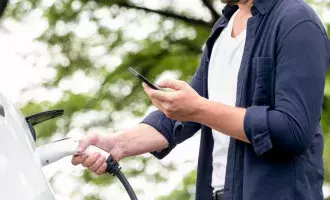More consumers can now choose to charge an electric car at home, generate their own electricity from solar panels, track their energy usage with a smart meter and turn their washing machine on wirelessly when their energy is at its cheapest.
This inter-connected, digital world is changing our attitudes towards energy supply and our usage of it, for good. And that’s transforming what we expect from customer experience.
Two huge societal shifts are at play here. On one hand there is the vital need to switch to renewable energy sources to meet our zero-emissions target and protect the planet for future generations. On the other hand, consumer needs have altered significantly. It’s no longer enough for energy companies to focus on a transactional relationship and compete on cheaper tariffs alone, instead consumers want to communicate digitally and understand more about where and how their energy is sourced.
So how can energy companies be proactive in their response to these changes, remain relevant and create great customer experiences that last?
The green industrial revolution
In 2020, the Government published its ten-point plan(1) to “build back better, support green jobs, and accelerate our path to net zero.” Its Energy White Paper(2) followed shortly after, which details how it intends to make the transition from fossil fuels to clean energy by 2050. The Government wants to see greater competition and more innovation to drive down energy costs and accelerate decarbonisation in the UK.
Key to this will be opening-up data on energy consumption. The Data Communications Company (DCC), which provides the data and communications services that underpin smart metering in the UK, has proposed a “Data for Good Exchange”. This would open-up data from the smart meter network so it can be analysed and combined with data from other organisations to drive innovation. The DCC says this could be a “game-changer for the country’s Net-Zero ambitions(3).” It will also be huge for customer experience; making it easier for customers to access smart products and flexible tariffs that suit their lifestyles and help to reduce their energy consumption.
The arrival of the ‘15-minute town’ will shape future energy consumption
The coronavirus pandemic is likely to have changed the way we live, work, shop and travel for good. Technology has shown that people can work from home productively and they are unlikely to want to return to unnecessary commuting.
The concept of the "15-minute city" was developed by Professor Carlos Moreno at the Sorbonne University in Paris(4). It aims to improve quality of life by creating cities and towns where everything people need can be reached within a fifteen-minute walk or bike ride. Ipswich is intending to become the UK’s first 15-minute town by following Moreno’s concept and creating more of a neighbourhood than a shopping destination with more housing, green spaces, and recreation facilities.
More communities like this, where the emphasis is on greener travel and local facilities, will alter energy requirements. Huge office blocks could be replaced with local hybrid-workspaces for people to combine with working from home, and the demand for smart home devices will increase. There will be less commuting and international travel, and greater need for local charging points for electric cars, bikes and scooters.
There will also be more opportunity for communities to generate their own electricity and kick-start a new relationship with energy providers.
Transforming customer experience
If customer experiences are to evolve in this new green industrial revolution, they need to be more sophisticated. Energy companies need to be more dynamic, responsive and more relevant. We’re already seeing the impact that more agile, challenger brands such as Bulb and Octopus Energy are having by taking a tech-first approach to customer service. Octopus Energy won ‘Supplier of the Year’ for the second year running at the 2021 Uswitch energy awards, with a customer satisfaction score of 92%. Bulb was runner-up with 88%(5).
The traditional ‘Big Six’ providers such as Centrica and E.On know they need to innovate to broaden their offering and improve customer experience. For example, Centrica launched its Hive brand to provide smart products and services to help people control the energy in their homes and reduce their carbon footprint – this fosters a new relationship with customers away from energy supply.
Seizing the opportunities of a new energy ecosystem through partnerships
We now have a vast ecosystem that includes energy providers, the smart meter network and the companies that offer smart home products. We need partnerships to glue this ecosystem together and provide a seamless customer experience.
Providers understand that to be more competitive they need to work more closely with their competitors. For example, Octopus Energy has grown rapidly thanks to its digital customer service platform. Other energy providers such as Good Energy and E.On are now paying for a licence to use it. Good Energy is using the platform to roll out future smart products and services and provide a single customer view(6). While the platform is helping E.On to provide “an easy to understand, transparent and personalised customer service(7).”
For business supply, O2 and SSE launched an offer that lets O2 suppliers and partners buy renewable energy direct from SSE Business Energy at a reduced rate(8).
These partnerships are better for consumers, as they offer a broader range of products and services, while putting digital technology at the centre of customer experience. However, the challenge is how to use these partnerships to create a truly seamless customer journey. In a customer's mind how they source, generate and use their electricity needs to be simple and joined-up, not a complex labyrinth of different suppliers and accounts. Overcoming this challenge will be key to unlocking the full potential of the new energy ecosystem.
References:
[1] The ten point plan for a green industrial revolution - GOV.UK (www.gov.uk)
[2] Energy white paper: Powering our net zero future - GOV.UK (www.gov.uk)
[3] Freeing up access to smart meter system data will help reach Net Zero (smartdcc.co.uk)
[4] The 15 minutes-city: for a new chrono-urbanism! - Pr Carlos Moreno - Carlos Moreno (moreno-web.net)
[5] Uswitch Energy Awards 2021 | Best customer service | Uswitch
[6] Good Energy to implement new customer service platform in 2020 | Octopus Energy
[7] E.On says move to Octopus Energy’s Kraken customer platform will make it ‘market leading’ on costs | New Power
[8] O2 and SSE Business Energy launch new offer to help supply chain switch to renewable energy - O2 The Blue

Chris Cartwright
Critical Infrastructure Market leader
Chris is a Senior Executive with over 20 years’ experience in Energy/ Utilities/ Infrastructure and Consulting. Chris is currently a Market Sector Leader and Head of Critical Infrastructure at Capita Consulting. Chris is a Chartered Engineer and Fellow with the Institution of Engineering and Technology and is currently the chair of the Digital Sector Executive panel.







